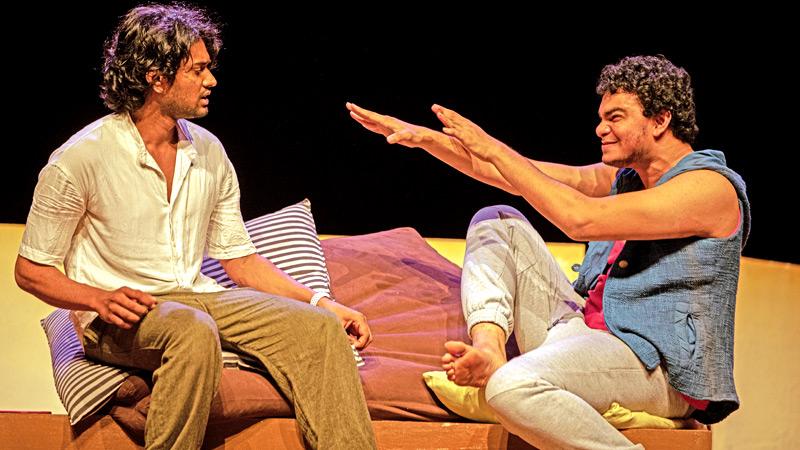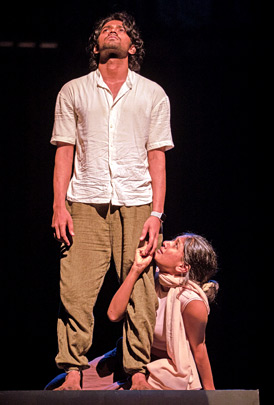
I think PING! – produced by the Youth Ensemble of the Stages Theater Company – hit people in different ways depending on who they were. I could relate to much as a mother - and as a daughter too. The younger crowd who made up my group reacted differently at different places – laughing when I didn’t, for example, and perhaps having different spine-chilling moments of déjà vu than me.
 Jah is scared for Dirk (Pix: Prawuda Buwaneka) |
For spine-chilling it was for adults, at times, in the visceral way it dealt with young people’s problems from their own point of view – never for a moment could you doubt that this was a play written by those who were not mothers and fathers yet. Every wart and blimp of parenting was fully under the spotlight on stage – and I doubt if there was any adult there who could not identify with one or another of the ‘mistakes’ thrown quite powerfully at our faces by these young actors.
Of course, the problems were class-specific too as they tend to be. The setting was from the middle or upper-middle class, mainly English-speaking families. The issues associated with them may not have been the ones that affect the majority of the population of Sri Lanka, though problems unfolding through social media platforms seem to be rather universal now.
In any case, restricting discussion to a class that is a minority doesn’t make the depictions of their emotions any less valid. There is honesty in dealing with problems associated with your own life no matter to which strata that life belonged to – people like this live, they deserve their stories to be told too, and sometimes the issues they grapple with are universal.
Like the main problem affecting the main character, Dirk. I can hazard a guess that this was one thing that made many young people uncomfortable that evening – incestuous feelings are never easy to discuss. That it may be a biological factor that needs to be seen as such and would probably pass away, was the only good piece of advice that an adult gave a younger person in the whole play.
Son’s problems
That moment too is undermined by the fact that the adult is not the boy’s father, and his actual son is seen listening to this conversation and hears the father say that he would prefer to have this kind of problem than what he actually does with his own son. There is no relief in this moment too, therefore, for the audience.
His own son’s problems are the problems of a generation that lives in a virtual reality - the internet persona being a far cry from the nervous stuttering young man this son is in actual life. And yet, the father’s merciless insistence on pushing him to be other than he is, still seems very harmful. It is actually that sense of not mattering to the father that drives this young man to the final cruelty three young people unleash on another.
From the other two, one is almost a caricature of a shallow, social media based, rather unintelligent girl – or even someone who has a lot of growing up to do, if one is kinder. The other is a truly annoying child, hyper to the point of danger. Together with the SM influencer, they form a rather deadly group when they feel slighted – and their cruelty is given fangs when slogans from movements like the “Me Too” one becomes easily adaptable without any real understanding of what they stand for.
 One stark evil – somehow that word doesn’t feel inappropriate – was their sense of entitlement; they had no problem in trying to destroy a twelve-year-old child’s mind as revenge for any disrespect shown to them, imagined or otherwise. What they did at the end with Dirk’s phone was truly maddening; the ending of the play swung dizzyingly between safety and tragedy – and just at the moment the brother and sister could finally hug each other without any sexual connotations after a very long time, the curtain falls on a tragedy foretold by the “ping” that goes off in every adult’s phone simultaneously, carrying a notification of a message that should not have seen the light of day.
One stark evil – somehow that word doesn’t feel inappropriate – was their sense of entitlement; they had no problem in trying to destroy a twelve-year-old child’s mind as revenge for any disrespect shown to them, imagined or otherwise. What they did at the end with Dirk’s phone was truly maddening; the ending of the play swung dizzyingly between safety and tragedy – and just at the moment the brother and sister could finally hug each other without any sexual connotations after a very long time, the curtain falls on a tragedy foretold by the “ping” that goes off in every adult’s phone simultaneously, carrying a notification of a message that should not have seen the light of day.
Restless allure
The “ping” is ubiquitous – as it is in life as we live it now, with all of us probably equally caught in its restless allure. The name of the play captures the power of social media platforms that people depended on almost completely during the pandemic times – that became the main medium of communication for young people caught within their houses - though in this case the apartment dwellers could actually meet physically.
The play skillfully shows the problems associated with one platform – probably WhatApp: one can never know who actually wrote the message – in this case a serious thoughtful girl supplies words to a rather unthinking one to send to the boy the latter likes, and precipitates a relationship that should never have taken place; one might forget that it’s a group chat and say things that should not be seen by others; it becomes easy to spread evil all around to multiple phones, by the simple and easy press of a button.
The young people have written a play, therefore, that deals with the problems of their own making as well as those created by the adults around them. The only one who seemed to understand what is what was the girl named Jah, who was almost a relief to see on stage as she seemed to personify sense when no one else did, just like the youngest girl child seemed to personify innocence. In a way, all the young people became symbols of something – guilt, shallowness, virtually built-up personality, hyperactive attention seeking child and so on.
Collaborative effort
Yet that allegorical level worked, it opened up a range of personalities we do find in the modern probably city-based young people’s world. Even the adults could be categorized as something or other but as a whole their obliviousness to the problems of their children was startling. The most annoying, personally, was the mom who decides to take the responsibility of making the other parents “better” when she herself was making rather a meal of it with her own kids.
I was very interested in finding out who wrote this play, and was told that it was a collaborative effort by young people led by Ruwanthie de Chickera. I have been a fan of Ruwanthie’s writing from decades ago – her recent Dear Children, Sincerely tackled a much-needed rewriting of Sri Lankan history. To find out that she was workshopping a group of young people in the art of playwrighting was truly uplifting, and given the play that was written, it is good that we take note of the lead writers Banuja Nethusara Dehigaspage, Hajarah Faleel and Samuel Sundaralingam who were supported by Akmal Hamid, Nivedhith Jeyashanker and Kithmi Ranatunga, and hope that they become the next generation of serious playwrights in Sri Lanka. I wondered why they had a printout of the Acts and Scenes on the chairs at Lionel Wendt – I didn’t find the plot difficult to follow. It was fragmentary and episodic – but it hung together well and made a story.
Movements between scenes were slick and polished, sometimes characters being wheeled onto the stage on the prop itself. Minimalist decor also heightened the tension – the one surrealist moment was when the ‘suicide-jump ledge’ was casually used as a place for sitting down to have a chit chat – and multiple locations were handled well, especially in the scene all the young people were simultaneously shown texting each other in their separate apartments. The lack of long pauses between scenes kept the intensity of the play unflagging.
The acting
A mention about the acting before I end – it was very good overall. Some needed more acting skill than others, I felt – all the young people in fact: the influencer was very convincing in his weird switches between personalities; young Shakeel acted well enough to make one want to sock him one on the jaw; Kaya was superb in her depiction of a very careless and self-centered young woman.
Among the adults Noorah stood out in her oblivious, self-obsessed personality – the only time some authentic mothering was seen was when she begs her son to be careful with what he does to others – the rest of the time she set herself up to be intensely disliked by both mature adults like me and young people, I think. The influencer’s father seemed very familiar too – the macho dude like guys are not difficult to find here. There was this girl on stage who acted the character of Jah who seemed a young version of Ruwanthie de Chickera herself – both in her body and very subtle gestures – and it was a bit disorienting till someone told me later that it was, in fact, her daughter. How lovely to have a second generation not too far from the rather awesome ways of the first!
This play gives me hope. It shows the existence of a young pool of writers and actors who are unafraid to put controversial thoughts on paper, who can act at very professional levels, and over and above everything, can consider their art to be worth the thought and serious work they put into it.
Lihan Mendis co-directed this with Ruwanthie and produced it – that’s another young man on whom we can pin a lot of expectations. I have only seen him acting once – and that was at a Prize Giving of Trinity College or something, where he stripped himself partially on stage with a very irreverent political skit – but it was enough to give an idea of what he was capable of. This was the young ensemble of the Stages Theater Group. It was a young people’s play - on young people hangs the future - and in Sri Lanka, where the future is greatly to be feared in many aspects – this calls for celebration.
